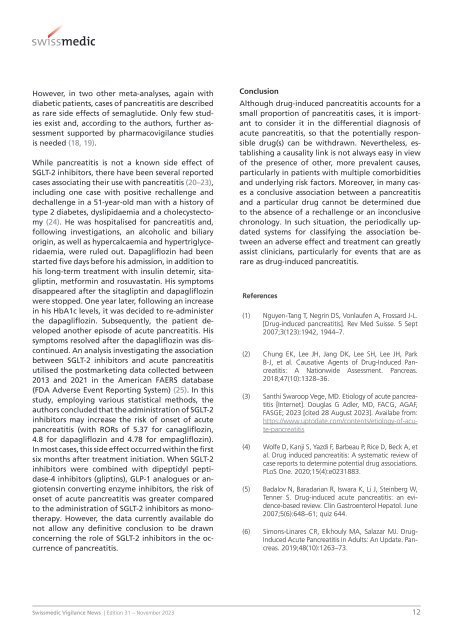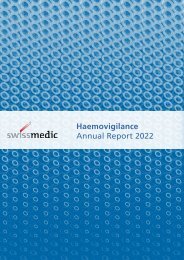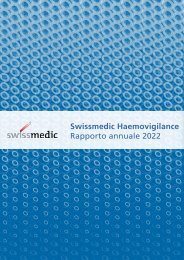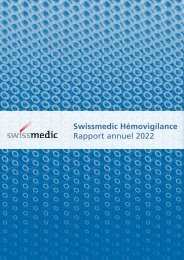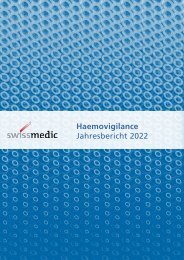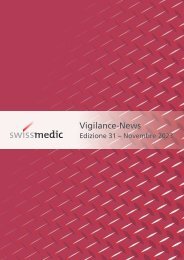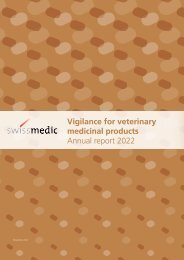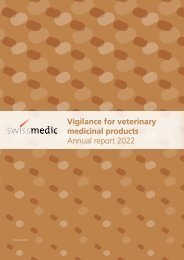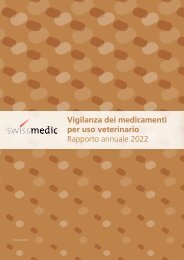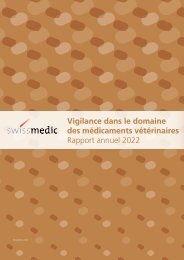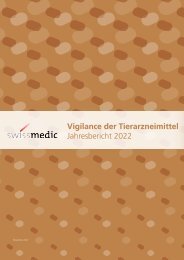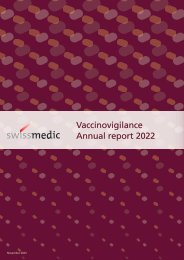Swissmedic Vigilance News
Edition 31 – November 2023
Edition 31 – November 2023
Create successful ePaper yourself
Turn your PDF publications into a flip-book with our unique Google optimized e-Paper software.
However, in two other meta-analyses, again with<br />
diabetic patients, cases of pancreatitis are described<br />
as rare side effects of semaglutide. Only few studies<br />
exist and, according to the authors, further assessment<br />
supported by pharmacovigilance studies<br />
is needed (18, 19).<br />
While pancreatitis is not a known side effect of<br />
SGLT-2 inhibitors, there have been several reported<br />
cases associating their use with pancreatitis (20–23),<br />
including one case with positive rechallenge and<br />
dechallenge in a 51-year-old man with a history of<br />
type 2 diabetes, dyslipidaemia and a cholecystectomy<br />
(24). He was hospitalised for pancreatitis and,<br />
following investigations, an alcoholic and biliary<br />
origin, as well as hypercalcaemia and hypertriglyceridaemia,<br />
were ruled out. Dapagliflozin had been<br />
started five days before his admission, in addition to<br />
his long-term treatment with insulin detemir, sitagliptin,<br />
metformin and rosuvastatin. His symptoms<br />
disappeared after the sitagliptin and dapagliflozin<br />
were stopped. One year later, following an increase<br />
in his HbA1c levels, it was decided to re-administer<br />
the dapagliflozin. Subsequently, the patient developed<br />
another episode of acute pancreatitis. His<br />
symptoms resolved after the dapagliflozin was discontinued.<br />
An analysis investigating the association<br />
between SGLT-2 inhibitors and acute pancreatitis<br />
utilised the postmarketing data collected between<br />
2013 and 2021 in the American FAERS database<br />
(FDA Adverse Event Reporting System) (25). In this<br />
study, employing various statistical methods, the<br />
authors concluded that the administration of SGLT-2<br />
inhibitors may increase the risk of onset of acute<br />
pancreatitis (with RORs of 5.37 for canagliflozin,<br />
4.8 for dapagliflozin and 4.78 for empagliflozin).<br />
In most cases, this side effect occurred within the first<br />
six months after treatment initiation. When SGLT-2<br />
inhibitors were combined with dipeptidyl peptidase-4<br />
inhibitors (gliptins), GLP-1 analogues or angiotensin<br />
converting enzyme inhibitors, the risk of<br />
onset of acute pancreatitis was greater compared<br />
to the administration of SGLT-2 inhibitors as monotherapy.<br />
However, the data currently available do<br />
not allow any definitive conclusion to be drawn<br />
concerning the role of SGLT-2 inhibitors in the occurrence<br />
of pancreatitis.<br />
Conclusion<br />
Although drug-induced pancreatitis accounts for a<br />
small proportion of pancreatitis cases, it is important<br />
to consider it in the differential diagnosis of<br />
acute pancreatitis, so that the potentially responsible<br />
drug(s) can be withdrawn. Nevertheless, establishing<br />
a causality link is not always easy in view<br />
of the presence of other, more prevalent causes,<br />
particularly in patients with multiple comorbidities<br />
and underlying risk factors. Moreover, in many cases<br />
a conclusive association between a pancreatitis<br />
and a particular drug cannot be determined due<br />
to the absence of a rechallenge or an inconclusive<br />
chronology. In such situation, the periodically updated<br />
systems for classifying the association between<br />
an adverse effect and treatment can greatly<br />
assist clinicians, particularly for events that are as<br />
rare as drug-induced pancreatitis.<br />
References<br />
(1) Nguyen-Tang T, Negrin DS, Vonlaufen A, Frossard J-L.<br />
[Drug-induced pancreatitis]. Rev Med Suisse. 5 Sept<br />
2007;3(123):1942, 1944–7.<br />
(2) Chung EK, Lee JH, Jang DK, Lee SH, Lee JH, Park<br />
B-J, et al. Causative Agents of Drug-Induced Pancreatitis:<br />
A Nationwide Assessment. Pancreas.<br />
2018;47(10):1328–36.<br />
(3) Santhi Swaroop Vege, MD. Etiology of acute pancreatitis<br />
[Internet]. Douglas G Adler, MD, FACG, AGAF,<br />
FASGE; 2023 [cited 28 August 2023]. Availabe from:<br />
https://www.uptodate.com/contents/etiology-of-acute-pancreatitis<br />
(4) Wolfe D, Kanji S, Yazdi F, Barbeau P, Rice D, Beck A, et<br />
al. Drug induced pancreatitis: A systematic review of<br />
case reports to determine potential drug associations.<br />
PLoS One. 2020;15(4):e0231883.<br />
(5) Badalov N, Baradarian R, Iswara K, Li J, Steinberg W,<br />
Tenner S. Drug-induced acute pancreatitis: an evidence-based<br />
review. Clin Gastroenterol Hepatol. June<br />
2007;5(6):648–61; quiz 644.<br />
(6) Simons-Linares CR, Elkhouly MA, Salazar MJ. Drug-<br />
Induced Acute Pancreatitis in Adults: An Update. Pancreas.<br />
2019;48(10):1263–73.<br />
<strong>Swissmedic</strong> <strong>Vigilance</strong> <strong>News</strong> | Edition 31 – November 2023<br />
12


